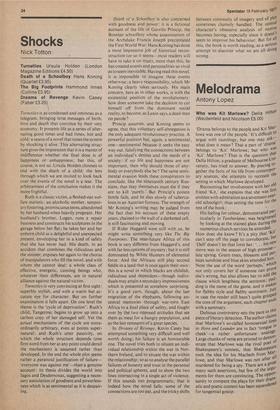Shocks
Nick Totton
Turnstiles Ursula Holden (London Magazine Editions £4.50) Death of a Schoolboy Hans Koning (Quartet 23.95) The Big Footprints Hammond Innes (Collins £3.95) Dreams of Revenge Kevin Casey (Faber £3.25)
Turnsti/es is as condensed and ominous as a telegram, bringing terse messages of birth, love and death that convince by their very economy. It presents life as a series of alternating good times and bad times, hot and cold : a sauna of a novel that tones the system by shocking it alive. This alternating structure gives the impression that it is a matter of indifference whether the final dose is of happiness or unhappiness; but this, of course, is not so. Ursula Holden chooses to end with the death of a child: the lens through which we are invited to look back over the events of the novel is a tear. The arbitrariness of the conclusion makes it the more frightful.
Ruth is a classic victim, a fleshed-out welfare statistic: an alcoholic mother, temporary fostering, promiscuous teens, abandoned by her husband when heavily pregnant. Her husband's brother, Logan. runs a repair business and constructs his sculptures in the garage below her flat; he takes her and her unborn child as a delightful and unexpected present, enveloping her in a kind of safety that she has never had. His death, in an accident that combines the ridiculous and the sinister, exposes her again to the chorus of manipulators who fill the novel, and with whom she cannot deal: a whole class of effective, energetic, cunning beings who, whatever their differences, are in natural alliance against the natural victim.
Turnstiles is very convincing at first sight: superbly stylish, and with a warm but accurate eye for character. But on further examination it falls apart. On one level the theme is the 'cycle of deprivation': Ruth's child, Tangerine, begins to grow up into a carbon copy of her damaged self. Yet the actual mechanisms of the cycle are extraordinarily arbitrary, even at points supernatural; and Ruth's utter passivity, on which the whole structure depends (one firm word from her at any point could derail the mechanism) is assumed rather than developed. In the end the whole plot seems rather a paranoid justification of failure— 'everyone was against me'—than a genuine account: its thesis divides the world into Lagos and Desdemonas, suggesting a necessary association of goodness and powerlessness which is as sentimental as it is despairing. Death of a Schoolboy is also concerned with goodness and power: it is a fictional account of the life of Gavrilo Princip, the Bosnian schoolboy whose assassination of the Archduke Francis Joseph precipitated the First World War. Hans Koning has done a most impressive job of historical reconstruction (or so it seems—most readers will have to take it on trust); more than this, he has created events and personalities so vivid as to seem inevitable. Having read this novel, it is impossible to imagine these events otherwise; a heavy responsibility, which Mr Koning clearly takes seriously. His main concern, here as in other works, is with the existential position of the revolutionary: how does someone take the decision to cut himself off from the dominant social reality, to become, as Lenin says, a dead man on parole?
Princip assumes, and Koning seems to agree, that this voluntary self-abnegation is the only adequate revolutionary practice. A powerful position but, again, a sentimental. one--sentimental because it seeks the easy way out, falsifying the connections between an individual's desires and the needs of a society: if my life and happiness are not important, then why should those of anybody or everybody else be? The same sentimental evasion leads these conspirators to conclude, like the nineteenth century Russians, that they themselves must die if they are to kill 'purely.' But Princip's poison bottle fails, and he dies slowly of tuberculosis in an Austrian fortress. The strength of Mr Koning's writing may be judged from the fact that his account of these empty years, chained to the wall of a darkened cell, is still fascinating and moving.
If Rider Haggard were still with us, he might write something very like The Big Footprints. The near-future Africa of this book is very different from Haggard's, and with far less options of mystery; but it is still dominated by White Hunters of elemental force. And the Africans still play second fiddle in a land that is once again their own: this is a novel in which blacks are childish, ridiculous and dependent—though individuals may attain a secondary impressiveness which is presented as somehow surprising. It's a good yarn, though, about the last migration of the elephants, following ancestral memories through war-torn East Africa to a final place of safety, and fought over by the two opposed attitudes that see them as meat for a hungry population, and as the last remnants of a great species.
In Dreams of Revenge, Kevin Casey has attempted something very difficult and well worth doing; his failure is an honourable one. The novel tries both to situate an individual relationship within the war in Northern Ireland, and to situate the war within the relationship; so as to analyse the parallel failures of honesty and trust in the personal and political spheres, and to show the two lines intersecting in a single act of violence. If this sounds too programmatic, that is indeed how The novel fails: some of the connections are too pat, and the tricky shifts
between continuity of imagery and of plot sometimes clumsily handled. The central character's obsessive analysis of motive becomes boring, especially since it doesn seem to improve his behaviour. But for all this, the book is worth reading, as a serious attempt to discover what we are all doing wrong.


































 Previous page
Previous page